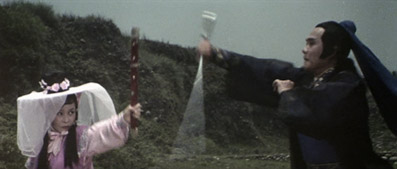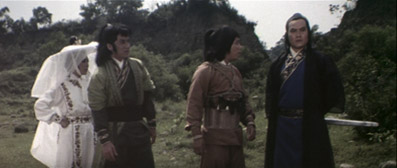|
It's
safe to say the most obvious claim to fame of the 1978 Magnificent
Bodyguards [Fei du juan yun shan] is that it provided an early starring role for the 24-year-old
Jackie Chan. He plays Lord Ting Chung, owner of the fastest
fists in the East, who is hired by the rich and beautiful
Lam Nan to transport her and her sick brother across the
Stormy Mountains, a haven for robbers and evil-doers that
no sane person would normally think of entering. He knows
he'll need help and it arrives in the form of the formidable
Twin Sword Sisters, kick-boxing deaf leather-worker Chang,
and Chung's old compatriot Tsang, also known as The Skinning
Swordsmen, a fighter that newcomers are initially likely to
mistake for the bad guy. He joins the party not for profit
but because he killed a bandit known as The God of Darts,
and he prefers to go after the villain's lover Lady Liu rather
than sit and wait for her to enact her revenge.

Some
slightly busier plotting than the genre norm (which falls
on its face with a last act surprise twist involving the
true identity of their foe, as daft a revelation as anything
Stephen Chow might play for laughs) moves the group from
one encounter to another as they are collectively and individually
attacked by a variety of foes, from rock-throwing rogues
dressed like Apache warriors to blade-wielding monks and
Lady Liu herself. Opportunities are missed to have fun with
the various members of the party (there are strong hints
about the background of the Twin Sword Sisters, for example, which could have proved
interesting enough to warrant a film of their own had they
been more fully developed) and the meatier fights are often
men-only affairs, although when you have Chan, James Tien
and Bruce Liang in the lead roles this is hardly surprising.
When they do let rip it's usually memorable, their fighting
skills and some nifty choreography (by Chan and Tien) delivering
a string of well staged battles featuring a variety of fighting
styles and weaponry. Chung's one-on-one with Liu and an
exceptionally good brawl in the Luo Han temple give the
young Chan the chance to show off some of the skills he
would soon be renowned for, although the comedy here is
confined largely to brash over-confidence and occasionally
amusing one-liners – when Tsang takes charge he insists
that no-one leave the group without permission, that they
be quiet at all times and that there be no drinking, only
to have Chung pipe up hopefully, "Can we be flexible
on the drinking?"
The
story is kept moving at a brisk trot by Lo Wei, a genre
legend whose credits include the Bruce Lee duo of The
Big Boss and Fist of Fury and a number of films with Chan, including New Fist of Fury (Xin Chung-wu
men 1976), To Kill With Intrigue
(Jian hua yan yu jiang nan 1977), Spiritual
Kung Fu (Quan jing 1978) and Dragon
Fist (Quan jing 1978). In recent
years, Wei has come in for some flack from fans, who believe
that he held Lee back and that Chan only really blossomed
as a performer when he was allowed to take creative control
himself. Certainly here Wei's camera placement and editing seem on
occasion a little peculiar, and I was a good third of the way
before it occurred to me that there
may be a reason for the plethora of rocks, fists, feet and
spears being thrust into the lens. A quick bit of
research (or five minutes with the commentary) confirmed
that the film was shot in Dual Strip 3-D, hence the numerous
shots inserted just to show off the process and make the
audience duck.
Magnificent
Bodyguards is a brisk and likeable early Chan vehicle
that genre fans should enjoy for the well showcased fighting
skills of its leads, and the developing signs of the one
man comedy-action machine that Chan was later to become.
And it's hard to really dislike any martial arts film that
sends the party on their way with such an absurdly sincere
but cheerily upbeat musical tribute to their bravery and
skills, and which unashamedly steals whole chunks of its score
from Star Wars.
There
are cynical souls who have suggested that the new Ultrabit
label being applied to some recent Hong Kong Legends releases
is nothing more than a marketing ploy to suggest you're
getting something extra to stand in for the rather woeful
lack of extra features on the so labelled titles. After
all, the picture quality was pretty spiffy on a good many
of the pre-Ultrabit HKL releases, so what's the big deal?
Either way, I'll happily admit that previous Ultrabit titles
have looked damned good, especially for their age. Until
now, that is.

The
transfer here is probably the least impressive I've seen
on a Hong Kong Legends DVD in recent years. The picture
is soft, the colours often muted and the contrast wildly
variable, decent enough in places but washed out elsewhere.
Fine detail is almost completely lacking, with faces in
long shots rendered as indistinct blobs. On top of that,
there are whole sections affected by some very noticeable
frame jitter. On the plus side, dust spots and damage are
almost completely absent. The framing is 2.35:1 and the
picture is anamorphically enhanced.
The
soundtracks on offer are the usual 2.0 Cantonese mono and
5.1 Cantonese and English dub remixes. The 5.1 does appear
to be slightly cleaned up from the original mono, but is
still largely a monaural track with a few of the sound effects
redirected to the surrounds. Tonal range is not great,
but that's hardly surprising, and there is an underlying
hum to many scenes.
Now
it may well be that this is the best the film has ever looked
and sounded and that HKL were working from some ropey source
material, and I'd forgive a lot it this was admitted to
and indicated on the disc – after all, as it has been pointed
out of previous HKL commentary tracks, the Hong Kong film
industry of the 1970s were not concerned with film preservation
for the simple reason they never expected the product to
have lasting interest. But even if this is the case, I still
feel HKL have some cheek releasing the film under the Ultrabit
banner, which promises to deliver "the ultimate in
picture and sound quality" when that clearly just is
not possible with this print – the bitrate may be high,
but I'm willing to bet that lowering it would make little
or no difference here.
Commentary
by Andrew Staton
Staton's commentaries have proved a mixed bag in the past
and have tended to depend on who he is teamed up with –
paired with fellow martial arts cinema writer Aenie Hayirilioglu
for Fearless Hyena he provided a consistently informative and entertaining
track. Certainly there is some interesting stuff here, but
way, way too much of it has Staton simply describing what
is happening on screen, telling you what he supposes the
characters are thinking (if you watch their expressions
you shouldn't have too much trouble working that out for
yourself) and repeatedly pointing out that "this shot
would have looked great in 3D." He does highlight the
links with other films, but gets his dates mixed up a bit,
suggesting a Raiders of the Lost Ark influence
on a couple of scenes, despite the fact that Magnificent
Bodyguards was made three years before Spielberg's
boys'-own adventure. There is a suspicion that Staton has
very recently encountered and been angered by some negative
reaction to this film, as he gets quite hot under the collar
when discussing its merits, rightly but over-indignantly
defending the elements that are specific to Asian action
cinema.
The
usual HKL trailers are also included.
Magnificent
Bodyguards is better than some have claimed but
is unlikely to be destined for any sort of classic status.
A busier plot is not necessarily a smarter one, but the
action delivers in the hoped-for manner. As for the disc,
well I've said my piece, but really do feel that releasing
this one under the Ultrabit banner is taking the piss. Just
a little.
|